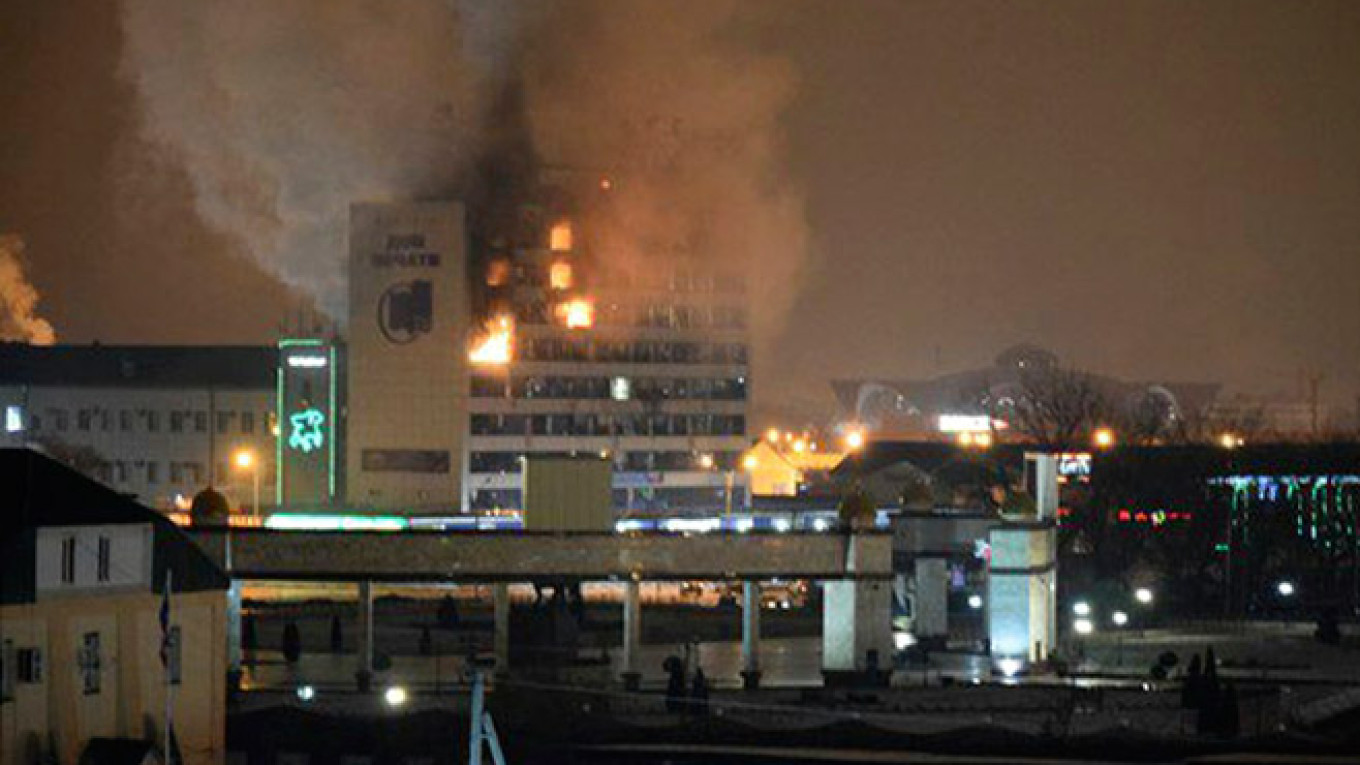The terrorist attack in Grozny on Dec. 4, the day of President Vladimir Putin's state of the nation address, was a brutal reminder that the problem of unrest in the Muslim republics of Russia's North Caucasus remains a mortal danger to the stability of the country in general and Putin's regime in particular. Fifteen years ago, Putin rose to the presidency pledging to "restore constitutional order" in the then-breakaway republic of Chechnya.
The nine gunmen on Dec. 4 arrived in the center of Grozny in the dead of night, where they were stopped by a police patrol and forced to take refuge in nearby buildings. All were eventually killed, at the cost of 14 police lives and 30 wounded. The fact that the group did not succeed in killing a large number of civilians is testimony to the effectiveness of the security regime of Chechen leader Ramzan Kadyrov, which relies on a blanket police presence and ruthless hounding of dissidents.
In the wake of the assault, Kadyrov announced that family members of those who took part in the attack will be expelled from Chechnya, and their houses will be leveled. Such punishments are not allowed under Russian law, but that has not proven an obstacle to Kadyrov's actions in the past.
Evidence thus far released suggests that this was a locally recruited gang, part of the Caucasus Emirate, and not loyal to a more far-flung terrorist network, such as Islamic State forces in Syria and Iraq. The last major attack sponsored by the Caucasus Emirate was the suicide assault on Moscow's Domodedovo Airport in January 2011, which killed 37.
However, it seems clear that large numbers of young men from the former Soviet Union have been drawn to the fighting in Syria and Iraq — just as they have been recruited from Britain, Canada, France and elsewhere. There are reportedly 1,000 Russian-speakers fighting on the side of Islamic militants in Iraq and Syria — split among the various rival factions — including many Chechens.
There has been some speculation that Ukrainian radicals might try to make common cause with anti-Russian Islamist terrorists. Chechens have been fighting on both sides in eastern Ukraine — some among the Russian "volunteers" supporting the separatists, and others supporting the Kiev government — such as a group led by Isa Munayev, a veteran of the Chechen independence wars. This development is manna to Russian propagandists and their narrative of the evil intentions of their opponents in Kiev.
However, the more serious problem that the Grozny attack highlights is domestic rather than international — the risk that the pro-Moscow rulers in the North Caucasus will lose their ability to control the situation in their respective republics.
It is not only that threats of terrorist violence emanate from the North Caucasus: The financial subsidies that Moscow pays to keep the republics in line are a drain on the Russian federal budget. Russian oppositionists complain that in return for Moscow's support, the leaders of the Caucasus republics shamelessly rig elections to deliver absurdly high votes for Putin and United Russia.
In December 2011, Chechnya delivered an implausible 99.48 percent of its votes for United Russia, while the national average was 64 percent. In neighboring Ingushetia 91 percent voted for United Russia, and in Dagestan 83 percent. In the March 2012 presidential election, Chechnya voted 99.76 percent for Putin, while Dagestan voted 92.8 percent and Ingushetia 91.9 percent. The millions of votes in the North Caucasus could prove decisive in ensuring a Kremlin victory in a future close-run federal election.
With the Kremlin under strain from a declining economy and unsettled standoff in eastern Ukraine, instability in the Caucasus is the last thing they need, since it brings attention back to the thorny question of whether the North Caucasus will in fact remain part of the Russian Federation in the long run.
Peter Rutland is a professor of government at Wesleyan University in Middletown, Connecticut.
A Message from The Moscow Times:
Dear readers,
We are facing unprecedented challenges. Russia's Prosecutor General's Office has designated The Moscow Times as an "undesirable" organization, criminalizing our work and putting our staff at risk of prosecution. This follows our earlier unjust labeling as a "foreign agent."
These actions are direct attempts to silence independent journalism in Russia. The authorities claim our work "discredits the decisions of the Russian leadership." We see things differently: we strive to provide accurate, unbiased reporting on Russia.
We, the journalists of The Moscow Times, refuse to be silenced. But to continue our work, we need your help.
Your support, no matter how small, makes a world of difference. If you can, please support us monthly starting from just $2. It's quick to set up, and every contribution makes a significant impact.
By supporting The Moscow Times, you're defending open, independent journalism in the face of repression. Thank you for standing with us.
Remind me later.


